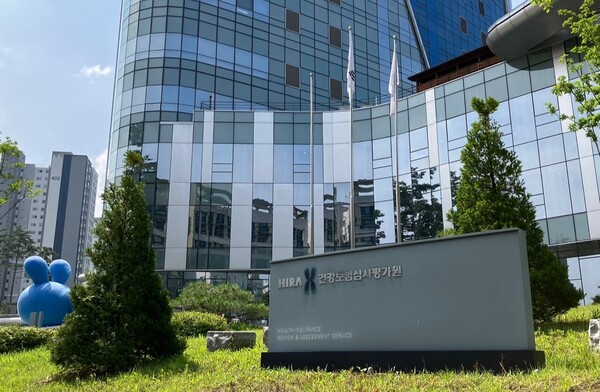Starting in November, the health insurance coverage standards will be newly established or expanded for the JAK inhibitors Jyseleca (filgotinib) and Jakavi (ruxolitinib) and the interleukin-5 (IL-5) inhibitors Nucala (mepolizumab) and Cinqair (reslizumab).
The Health Insurance Review and Assessment Service (HIRA) announced Tuesday a partial amendment to the "Details on the Application Criteria and Methods for Medical Benefits" concerning these and other drugs.

HIRA has decided to reimburse the JAK inhibitor Jyseleca, introduced by Eisai, to treat rheumatoid arthritis and moderate-to-severe active ulcerative colitis.
Jyseleca is the fifth oral JAK inhibitor to be introduced in Korea, following Pfizer's Xeljanz (tofacitinib) and Cibinqo (abrocitinib), Lilly's Olumiant (baricitinib), and AbbVie's Rinvoq (upadacitinib).
It is covered for the indications of rheumatoid arthritis and ulcerative colitis, approved by the Ministry of Food and Drug Safety (MFDS) in April last year. Like other JAK inhibitors, it is only used in patients who have not responded adequately to or are intolerant of existing treatments (biologics, such as TNF inhibitors) in patients “65 or older," "at high cardiovascular risk," or "at risk of malignancy.
Coverage for Novartis' Jakavi will also be expanded for treating steroid-refractory acute or chronic graft-versus-host disease in patients 12 and older.
Jakavi is indicated to treat myelofibrosis, polycythemia vera, and graft-versus-host disease. Myelofibrosis has been covered since 2015.
Graft-versus-host disease is a condition that occurs after allogeneic hematopoietic stem cell transplantation when the transplanted donor's T cells recognize the patient's normal cells as foreign and attack them. Steroids are usually the first line of treatment, but there is no standard treatment for patients who fail steroids.
Jakavi won approval from MFDS in May last year for treating acute or chronic graft-versus-host disease in patients 12 or older who have not responded adequately to prior corticosteroid therapy. The latest amendment expanded its reimbursement criteria to include the indication of graft-versus-host disease.
Biologics Nucala and Cinqair, used to treat severe eosinophilic asthma, are also newly covered by health insurance.
Until now, Novartis' Xolair (omalizumab), approved in 2007, has been the only covered biologic for severe asthma. Even that has been available only for allergic asthma, and no biologic has been approved for eosinophilic asthma, which has a poor prognosis.
So far, there are four biologics recognized by MFDS as treatments for eosinophilic asthma, including Nucala and Cinqair, AstraZeneca's Fasenra (benralizumab), and Sanofi's Dupixent (dupilumab). The recent decision made two of them, Nucala and Cinqair, eligible for coverage.
Both are covered for "adult patients with severe eosinophilic asthma not adequately controlled despite high-dose inhaled corticosteroids-long-acting inhaled beta2-agonists (ICS-LABAs) and long-acting muscarinic antagonists (LAMAs)." However, their conditions were set slightly differently.
One of the conditions is the same: “Three or more acute exacerbations of asthma requiring systemic corticosteroids with a blood eosinophil count of 400 cells/㎕ or greater within the 12 months before the initiation of treatment."
Nucala is also covered for "four or more acute exacerbations of asthma requiring systemic corticosteroids with a blood eosinophil count of 300 cells/ml or greater within 12 months before initiation of treatment, or continuous use of oral corticosteroids at a level equivalent to prednisolone (5 mg/day) or higher for six months before the initiation of treatment."
As a general rule, switching between Nucala and Cinqair and switching from either of these agents to Xolair is not authorized. However, switching from Xolair to Nucala or Cinqair will be allowed on a case-by-case basis with a dosing note.
Besides, the revision also includes new benefits for osteoarthritis combination drugs and type 2 diabetes combination drugs.
For instance, in the treatment of osteoarthritis, PMG (Pionex Management Group) Korea’s Layla DS (celecoxib/dong quai-quince-siler divaricata –Korean Jerusalem sage-Siberian ginseng-hyssop-Chinese clematis-cinnamon-broiler-gentiana dahurica-cnidium officinale-gastrodia elata-carthamus tinc 25 percent ethanol softened ex (3. 5→1)) was added to the reimbursement list. Daewoo Pharmaceutical's Sita Act (sitagliptin/pioglitazone), a combination of DPP-4 inhibitors and thiazolidinediones (TZDs) for treating type 2 diabetes, and Boryung's Trubbudy (dapagliflozin/pioglitazone), a combination of SGLT-2 inhibitors and TZDs, were also added. However, Trubbudy is reimbursable only when used in combination with metformin.

